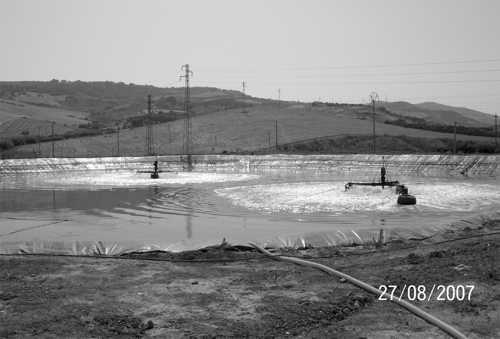
Главная
страница
Сведения об авторах
AGRICULTURAL RECYCLING OF OLIVE OIL MILL WASTEWATER AND EXPERIENCES ON CITRUS WASTEWATER LAGOONING IN SOUTHERN ITALY
Tamburino V., Zema D. A., Zimbone S. M., Mediterranean University of Reggio Calabria, Reggio Calabria, Italy
Olive and citrus processing industries play an important role in the agro-food system of Southern Italy. The high concentration of organic matter (OM) and inhibiting compounds, the seasonality of fruit processing and the high geographical dispersion of processing plants involve considerable technical and economic problems as regards the wastewater disposal. Proper management systems of agro-industrial effluents, providing efficiency and cheapness, must be adopted in order to increase profitability and competitiveness of processing industries within the olive and citrus market systems.
Both for olive oil mill wastewater (OMW) and citrus processing wastewater (CPW) the commonly used depuration systems have shown diseconomy and low efficiency, which mainly depend on the inadequacy of design criteria: in fact designers have often replicated the same criteria used for urban wastewater depuration, neglecting the peculiarity of OMW and CPW characteristics, as the high qualitative and quantitative variability, the acidity and the high organic load. Such depuration systems, utilising a wide range of biological and physical-chemical processes, turned out to be really expensive and often unreliable.
Alternative management systems of OMW and CPW, with low technologic and money requirements, can assure flexibility, cheapness and environmental sustainability, as shown by research activities and field experiences carried out in Southern Italy since long time.
Storage and land application of OMW seem to represent
the simplest and most efficient solution; the paper reports the results of some
recent researches, which highlighted that storage and land application of OMW:
— avoid water body pollution and risks of water runoff and soil erosion;
— reduce management costs, for example by utilising the common irrigation
systems;
— reconnect the natural cycles of OM and nutrients, thus restoring in soils what
was removed through harvesting;
— exploit the fertilising properties of wastewater for both herbaceous and tree
crops, thereby providing a tool for the development of an environmentally-sound
agriculture.
Nevertheless such OMW management scheme requires to comply with application standards in terms of irrigation doses and periods; also the possibility for soils of receiving wastewater must be investigated through the evaluation of their morphological (as slope), hydrological (water table depth and soil hydraulic infiltrability) as well as pedologic (grain size and aggregate stability) properties. A large scale planning approach, as experimented in Calabria region by the recent adoption of an «OMW land application plan», can be often adequate for this purpose.
With regard to CPW, within the raising attention to natural processes of wastewater treatment, the utilization of aerated lagoons has been recently experienced, generally providing good efficiency, relevant reliability as well as appreciable cheapness. The aerated lagoons, consisting in the storage of effluents in basins or tanks, exploit the self-depuration capacity of water bodies through aerobic and anaerobic bio-degradation processes (Figure).

Aerated lagoon filled with wastewater from a medium-sized citrus processing
industry (40.000 t year-1) in Sicily (Southern Italy)
As detailed in the paper, recent experiences, carried
out on effluents of some citrus processing plants, showed that CPW aerated
lagoon with hydraulic retention times longer than 3 weeks ensures:
— the reduction of organic compounds concentration through the dilution effect
within the aerated lagoon;
— the complete equalization of CPW qualitative characteristics, by limiting the
variability of organic load, pH and essential oils concentration;
— the proper regulation of intra-annual and intra-week variability of discharge
and organic load;
— an easy tuning and a high operating flexibility of the input factors needed by
the depuration process (in particular the energy costs).
The experienced researches carried out in Southern
Italy highlighted the advantages provided by the two discussed solutions for the
management of OMW and CPW. More investigations are thus needed in order to
analyse more in detail and under different operative aspects the development of
bio-chemical and physical processes affecting the natural depuration systems.
This work was carried out, with equivalent contributions of the Authors, within
the Project «Gestione sostenibile delle acque reflue olearie e dei sottoprodotti
di industrie agro-alimentari» funded by the Mediterranean University of Reggio
Calabria.
Tamburino Vincenzo, Department of Agro-Forest
and Environmental Science and Technology, Mediterranean
University of Reggio Calabria, Localitа` Feo di Vito, I-89100, Reggio Calabria,
Italy. Tel./fax (0965) 31-26-81.
E-mail
Zema Demetrio Antonio, Department of Agro-Forest and Environmental
Science and Technology, Mediterranean
University of Reggio Calabria, Localitа` Feo di Vito, I-89100, Reggio Calabria,
Italy. Tel./fax (0965) 31-26-81. E-mail
Zimbone Santo Marcello, Department of Agro-Forest and Environmental
Science and Technology, Mediterranean
University of Reggio Calabria, Localitа` Feo di Vito, I-89100, Reggio Calabria,
Italy. Tel./fax (0965) 31-26-81. E-mail
© Независимое агентство экологической информации
Последние изменения внесены 19.09.08